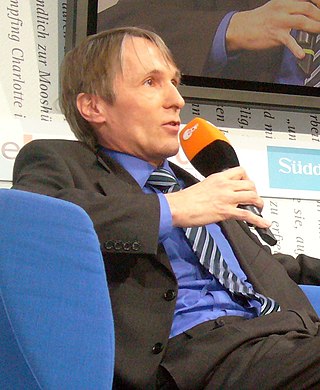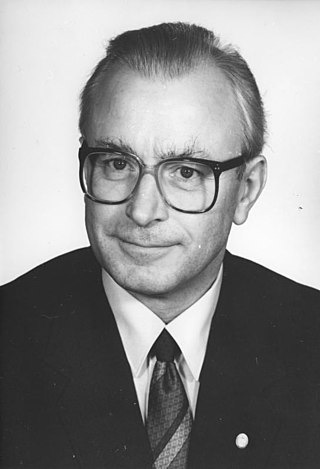
The Ministry for State Security, commonly known as the Stasi, an abbreviation of Staatssicherheit, was the state security service of East Germany from 1950 to 1990.

Erich Ernst Paul Honecker was a German communist politician who led the German Democratic Republic from 1971 until shortly before the fall of the Berlin Wall in November 1989. He held the posts of General Secretary of the Socialist Unity Party of Germany (SED) and Chairman of the National Defence Council; in 1976, he replaced Willi Stoph as Chairman of the State Council, the official head of state. As the leader of East Germany, Honecker was viewed as a dictator. During his leadership, the country had close ties to the Soviet Union, which maintained a large army in the country.

Erich Fritz Emil Mielke was a German communist official who served as head of the East German Ministry for State Security, better known as the Stasi, from 1957 until shortly after the fall of the Berlin Wall in 1989.

Hans Modrow was a German politician best known as the last communist premier of East Germany.
Articles related to East Germany include:

In German culture, Ostalgie is nostalgia for aspects of life in Communist East Germany. It is a portmanteau of the German words Ost (east) and Nostalgie (nostalgia). Its anglicised equivalent, ostalgia, is also sometimes used. Another term for the phenomenon is GDR nostalgia.

The Peaceful Revolution, as a part of the Revolutions of 1989, was the process of sociopolitical change that led to the opening of East Germany's borders with the West, the end of the ruling of the Socialist Unity Party of Germany (SED) in the German Democratic Republic in 1989 and the transition to a parliamentary democracy, which later enabled the reunification of Germany in October 1990. This happened through non-violent initiatives and demonstrations. This period of change is referred to in German as Die Wende.

Margot Honecker was an East German politician and influential member of the country's Communist government until 1989. From 1963 until 1989, she was Minister of National Education of the German Democratic Republic (GDR). She was married to Erich Honecker, leader of East Germany's ruling Socialist Unity Party from 1971 to 1989 and concurrently from 1976 to 1989 the country's head of state.

The Order of Karl Marx was the most important order in the German Democratic Republic (GDR). The award of the order also included a prize of 20,000 East German marks.

Republikflucht was the colloquial term in the German Democratic Republic for illegal emigration to West Germany, West Berlin, and non-Warsaw Pact countries; the official term was Ungesetzlicher Grenzübertritt. Republikflucht applied to both the 3.5 million Germans who migrated legally from the Soviet occupation zone and East Germany before the Berlin Wall was built on 13 August 1961, and the thousands who migrated illegally across the Iron Curtain until 23 December 1989. It has been estimated that 30,000 people left the GDR per year between 1984 and 1988, and up to 300,000 per year before the construction of the Berlin Wall in 1961.

The Pan-European Picnic was a peace demonstration held on the Austrian-Hungarian border near Sopron, Hungary on 19 August 1989. The opening of the border gate between Austria and Hungary at the Pan-European Picnic was an event in the chain reaction, at the end of which Germany reunified, the Iron Curtain fell apart, and the Eastern Bloc disintegrated. The communist governments and the Warsaw Pact subsequently dissolved, ending the Cold War.

The National Defense Council of the German Democratic Republic was created in 1960 as the supreme state body of the German Democratic Republic in charge of national defense matters, including mobilization planning. The NVR held the supreme command of the GDR's armed forces, and the NVR's chairman was considered the GDR's commander-in-chief.

Hubertus Knabe is a German historian and was the scientific director of the Berlin-Hohenschönhausen Memorial, a museum and memorial in a notorious former Stasi torture prison in Berlin. Knabe is noted for several works on oppression in the former Communist states of Eastern Europe, particularly in East Germany. He became involved with green politics, and was active in the Alliance '90/The Greens.

Wolfgang Schwanitz was a German intelligence official, who was the last head of the Stasi, the East German secret police. It was officially renamed the "Office for National Security" on 17 November 1989. Unlike his predecessor, Erich Mielke, he did not hold the title "Minister of State Security", but held the title of "Leader of the Office for National Security". Following the German reunification, he was active as an author of works that sought to portray the Stasi in a positive light.

Bruno Beater was an East German intelligence officer and politician. He served as First Deputy Minister of State Security in the administrations of Walter Ulbricht and Erich Honecker.
Zersetzung was a psychological warfare technique used by the Ministry for State Security (Stasi) to repress political opponents in East Germany during the 1970s and 1980s. Zersetzung served to combat alleged and actual dissidents through covert means, using secret methods of abusive control and psychological manipulation to prevent anti-government activities. People were commonly targeted on a pre-emptive and preventive basis, to limit or stop activities of dissent that they may have gone on to perform, and not on the basis of crimes they had actually committed. Zersetzung methods were designed to break down, undermine, and paralyze people behind "a facade of social normality" in a form of "silent repression".
Although prostitution in the German Democratic Republic was outlawed in 1968, it was partially tolerated thereafter.

The fall of the Berlin Wall on November 9, 1989, during the Peaceful Revolution, marked the destruction of the Berlin Wall and the figurative Iron Curtain. It was one of the series of events that started the fall of communism in Central and Eastern Europe, preceded by the Solidarity Movement in Poland. The fall of the inner German border took place shortly afterward. An end to the Cold War was declared at the Malta Summit three weeks later and the German reunification took place in October the following year.
Hanns Leske is a German sports historian, political scientist and former Berlin local politician.

Hero of the German Democratic Republic (GDR) was an honorific title awarded by the former East German state, accompanied by a certificate and medal. The title was instituted by the politburo of the Socialist Unity Party on 29 October 1975 as the most prestigious award of the GDR and first awarded on 28 November 1975. In total, it was awarded on 17 occasions to 11 recipients.


















